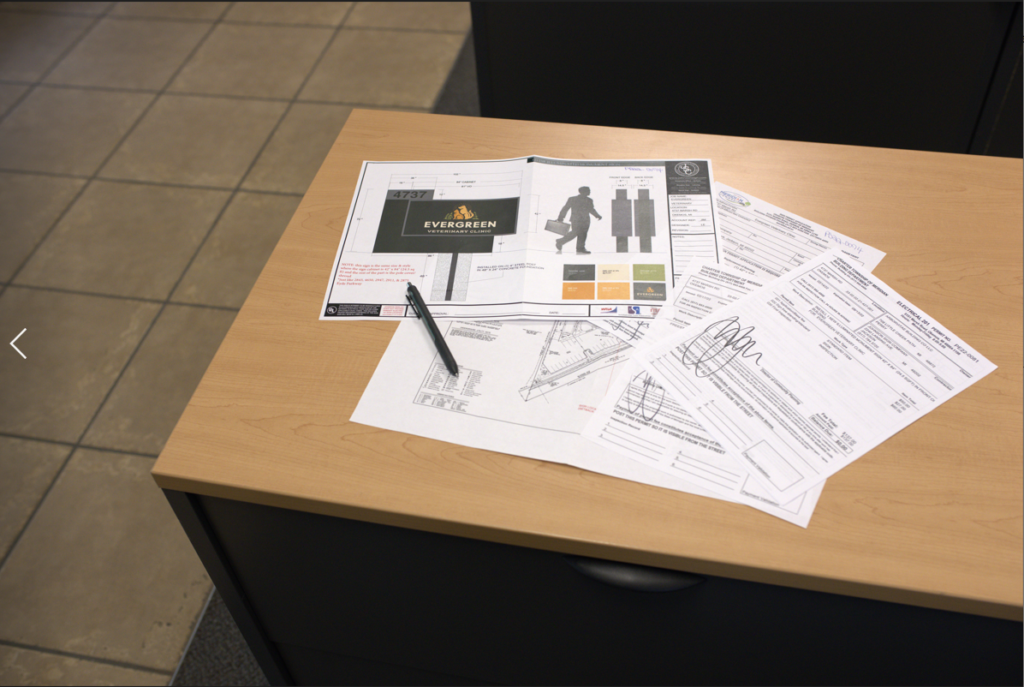Is Your Commercial Sign Legal?
When purchasing a sign for your business there are a lot of factors and decisions that go into play. One of the most important is what signage you are allowed to have versus the signage you desire to have.
Whether your business is in a village, city, or township, the signage that you’re allowed to have is governed by the local sign ordinance. The sign ordinance sets limits based on the zoning district or use of the property for allowable number, size, height and location of signs. Ordinances are written and adopted by local governments to set a standard for safety and aesthetic in the community. Obtaining a sign permit shows you are following these rules and that your sign can legally be there. If a sign permit is not secured there can be serious costs and consequences to a business.
Working with an experienced, full service, sign company can help you navigate the difficulties of reviewing and interpreting the sign code to maximize your available options while staying compliant with the local jurisdiction.
While we handle everything when it comes to sign permitting and variances, below are some important terms and questions to understand when purchasing a sign.

What is a sign permit?
A sign permit is a document approved by the local building authority certifying that a sign meets local ordinance requirements and minimum safety standards set by the building code. The sign permit allows us, the contractor on record, to install the sign and make any necessary electrical connections. Depending on your local jurisdiction a sign, building, or electrical permit, or some combination of the three may be required.
Though the requirements vary from city to city, generally a sign permit requires an approved print showing the proposed sign with any structural elements or electrical details, a signed contract or letter of authorization stating that we are contracted to install your sign, and a site plan showing where the sign will be located on the property. Sometimes more detailed information is needed on the sign structure or mounting methods, and in some cases stamped engineered drawings are required.
Why do I need one?
Permits can be required anytime a new sign is installed whether it be in the ground or on a wall, an existing sign is moved, or the face on an existing sign is changed. A permit is required for most exterior signs, including wall signs, freestanding signs, electronic message centers, awnings, and even temporary signs. Permitting a sign before installation protects the sign owner, ensuring that our license to install is valid and that all work is done to meet code requirements.
What is a sign variance?
A sign variance is an appeal to the local jurisdiction to allow the installation of a sign outside of the parameters set forth by the zoning ordinance. Variances only change the allowance for one parcel or property, not an entire zoning district.
Why would I need one?
A variance would be needed when unique circumstances exist on a property that do not allow for adequate identification when the ordinance is followed. Deviations in maximum sign size, height, or allowed materials would all require a variance. Alternatively, if a local ordinance has requirements that are too restrictive, a zoning amendment may be the way to go to change the ordinance to allow for more flexibility in a zoning district as a whole. Variances and amendments can be costly, and if cost is a concern ensuring the project starts with a code check is the best way to mitigate these issues.
When you choose a reliable sign company to secure permits or a variance for your sign, you gain a partner with the knowledge and experience necessary to move applications through the process, from code check, to applications, to approval. When we submit applications we follow them every step of the way, and will attend variance meetings to provide supporting information to get your sign approved.
If you have questions about securing permits for a new or existing sign, contact our sales team at INFO@JOHNSONSIGN.COM or call us at 800-517-3720 and we can help!